R8381
Dpn I from Diplococcus pneumoniae
Restriction Enzyme
Autenticatiper visualizzare i prezzi riservati alla tua organizzazione & contrattuali
About This Item
Numero CAS:
Numero MDL:
Codice UNSPSC:
12352204
Prodotti consigliati
Grado
for molecular biology
Forma fisica
buffered aqueous glycerol solution
Concentrazione
10,000 units/mL
Condizioni di spedizione
wet ice
Temperatura di conservazione
−20°C
Specificità
Recognition sequence: 5′-GmA/TC-3′
Ligation and recutting results: After 2-10-fold Dpn I overdigestion of 1 μg pBR322 DNA substrate, results in 100% cutting, >30% of fragments can be ligated, and >90% recut.
Heat inactivation: 75 °C for 15 minutes.
Ligation and recutting results: After 2-10-fold Dpn I overdigestion of 1 μg pBR322 DNA substrate, results in 100% cutting, >30% of fragments can be ligated, and >90% recut.
Heat inactivation: 75 °C for 15 minutes.
Applicazioni
DpnI is a restriction endonuclease that is used in molecular biological applications to cleave the recognition sequence 5′-GmA/TC-3′, generating DNA framents with blunt ends.
Altre note
Supplied with 10x Restriction Enzyme Buffer SA (B7531).
Comment: Since Dpn I will completely cleave only fully methylated pBR322 DNA, cleavage of 95% or more is considered complete digestion.
Stato fisico
Solution in 10 mM Tris-HCl, pH 8.0, 400 mM NaCl, 0.1 mM EDTA, 1 mM dithiothreitol, 200 μg/ml BSA, 50% glycerol (v/v) at 4 °C
Prodotti correlati
N° Catalogo
Descrizione
Determinazione del prezzo
Tampone di incubazione
N° Catalogo
Descrizione
Determinazione del prezzo
Codice della classe di stoccaggio
10 - Combustible liquids
Classe di pericolosità dell'acqua (WGK)
WGK 1
Punto d’infiammabilità (°F)
Not applicable
Punto d’infiammabilità (°C)
Not applicable
Certificati d'analisi (COA)
Cerca il Certificati d'analisi (COA) digitando il numero di lotto/batch corrispondente. I numeri di lotto o di batch sono stampati sull'etichetta dei prodotti dopo la parola ‘Lotto’ o ‘Batch’.
Possiedi già questo prodotto?
I documenti relativi ai prodotti acquistati recentemente sono disponibili nell’Archivio dei documenti.
S Lacks et al.
The Journal of biological chemistry, 250(11), 4060-4066 (1975-06-10)
A deoxyribonuclease specific for methylated DNA was isolated from Diplococcus pneumoniae. The enzyme, an endonuclease, degrades DNA for Escherichia coli to fragments of average molecular weight about half a million; it forms discrete fragments from phage lambda DNA. Methyl-deficient E.
K Alheim et al.
Journal of molecular endocrinology, 30(3), 359-368 (2003-06-07)
Glucocorticoids are known regulators of the cell cycle, normally exerting an anti-proliferative effect. We have previously shown that glucocorticoids stimulate expression of p57(Kip2), a member of the Cip/Kip family of cyclin-dependent kinase inhibitors which, in some cell types, may account
Min Ju et al.
The Journal of biological chemistry, 278(15), 12769-12778 (2003-02-01)
The human and rat forms of the Kv2.1 channel have identical amino acids over the membrane-spanning regions and differ only in the N- and C-terminal intracellular regions. Rat Kv2.1 activates much faster than human Kv2.1. Here we have studied the
C Kessler et al.
Gene, 92(1-2), 1-248 (1990-08-16)
The properties and sources of all known class-I, class-II and class-III restriction endonucleases (ENases) and DNA modification methyltransferases (MTases) are listed and newly subclassified according to their sequence specificity. In addition, the enzymes are distinguished in a novel manner according
Nico Mitro et al.
Methods in molecular biology (Clifton, N.J.), 952, 137-144 (2012-10-27)
The role of certain amino acids in the interactions of ligands with their cognate nuclear receptors is usually achieved by the resolution of the crystal structure of the receptor complexed with the ligand. As a complementary functional approach, site-directed mutagenesis
Il team dei nostri ricercatori vanta grande esperienza in tutte le aree della ricerca quali Life Science, scienza dei materiali, sintesi chimica, cromatografia, discipline analitiche, ecc..
Contatta l'Assistenza Tecnica.








